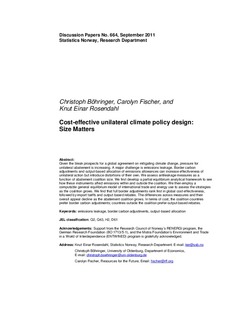| dc.contributor.author | Böhringer, Christoph | |
| dc.contributor.author | Fischer, Carolyn | |
| dc.contributor.author | Rosendahl, Knut Einar | |
| dc.date.accessioned | 2011-10-18T23:10:43Z | |
| dc.date.available | 2011-10-18T23:10:43Z | |
| dc.date.issued | 2011 | |
| dc.identifier.issn | 1892-753x | |
| dc.identifier.uri | http://hdl.handle.net/11250/180289 | |
| dc.description | Abstracts with downloadable Discussion Papers
in PDF are available on the Internet:
http://www.ssb.no | en_US |
| dc.description.abstract | Abstract:
Given the bleak prospects for a global agreement on mitigating climate change, pressure for unilateral abatement is increasing. A major challenge is emissions leakage. Border carbon adjustments and output-based allocation of emissions allowances can increase effectiveness of unilateral action but introduce distortions of their own. We assess antileakage measures as a function of abatement coalition size. We first develop a partial equilibrium analytical framework to see how these instruments affect emissions within and outside the coalition. We then employ a computable general equilibrium model of international trade and energy use to assess the strategies as the coalition grows. We find that full border adjustments rank first in global cost-effectiveness, followed by import tariffs and output-based rebates. The differences across measures and their overall appeal decline as the abatement coalition grows. In terms of cost, the coalition countries prefer border carbon adjustments; countries outside the coalition prefer output-based rebates. ___Keywords: emissions leakage, border carbon adjustments, output-based allocation | en_US |
| dc.description.sponsorship | Support from the Research Council of Norway’s RENERGI program, the German Research Foundation (BO 1713/5-1), and the Mistra Foundation’s Environment and Trade in a World of Interdependence (ENTWINED) program is gratefully acknowledged. | en_US |
| dc.language.iso | eng | en_US |
| dc.publisher | Statistics Norway | en_US |
| dc.relation.ispartofseries | Discussion Papers;No. 664 | |
| dc.subject | Climate change | en_US |
| dc.subject | Emissions | en_US |
| dc.subject | Klimaendringer | en_US |
| dc.subject | Utslipp | en_US |
| dc.subject | Climate policy | en_US |
| dc.subject | Klimapolitikk | en_US |
| dc.subject | JEL classification: Q2 | en_US |
| dc.subject | JEL classification: Q43 | en_US |
| dc.subject | JEL classification: H2 | en_US |
| dc.subject | JEL classification: D61 | en_US |
| dc.title | Cost-effective unilateral climate policy design: Size Matters | en_US |
| dc.type | Working paper | en_US |
| dc.subject.nsi | VDP::Social science: 200::Economics: 210 | en_US |
| dc.subject.nsi | VDP::Mathematics and natural science: 400::Geosciences: 450 | en_US |
| dc.source.pagenumber | 43. s. | en_US |
